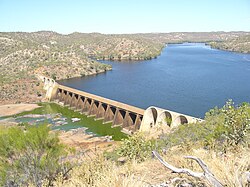Julius Dam
| Lake Julius (Julius Dam) | |
|---|---|
 |
|
| Location | 70 km (43 mi) North East of Mount Isa, Queensland |
| Coordinates | 20°07′53″S 139°43′23″E / 20.1315°S 139.723°ECoordinates: 20°07′53″S 139°43′23″E / 20.1315°S 139.723°E |
| Lake type | reservoir |
| Basin countries | Australia |
| Surface area | 1,255 ha (3,100 acres) |
| Average depth | 8.9 m (29 ft) |
| Max. depth | 25.2 m (83 ft) |
| Water volume | 107,500 ML (3,800×106 cu ft) |
| Surface elevation | 223.54 m (733.4 ft) |
| References | |
Lake Julius was formed following the construction of Julius Dam in 1976 for irrigation and town water storage. The dam wall is located just below the junction of the Leichhardt River and Paroo Creek some 70 kilometres (43 mi) North East of Mount Isa. It has a full supply capacity of 127,000 megalitres (4,500×106 cu ft), a surface area of 1,255 hectares (3,100 acres) with an average depth of 8.9 metres (29 ft).
The dam is unique in Queensland and is a concrete multiple arch and buttress type structure, with the spillway discharging over the tops of the arches. The spillway crest is 18.3 metres (60 ft) above bed level. The arch barrels, founded on a triangular arch base, are constructed in independent arch rings and are hinged at buttress springing lines. The spillway is a precast superstructure and the dissipation slab at ground level is post tensioned to the foundation rock.
The dam has a total storage capacity of 107,500 megalitres (3,800×106 cu ft), and has a full supply level of 223.54m AHD
SunWater is undertaking a dam spillway capacity upgrade program.
...
Wikipedia
